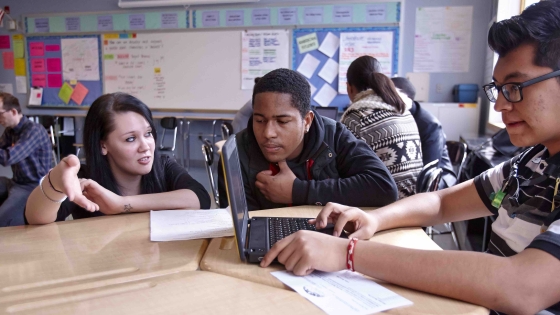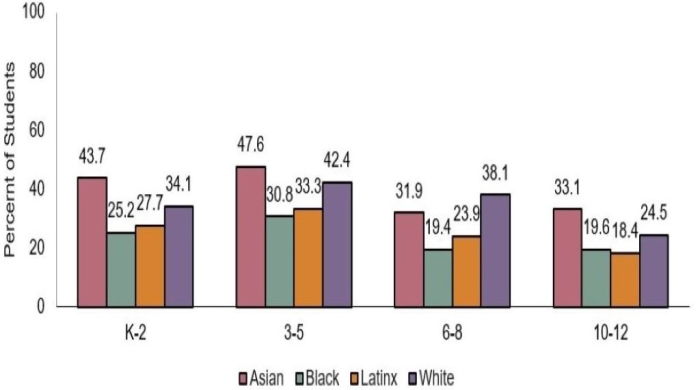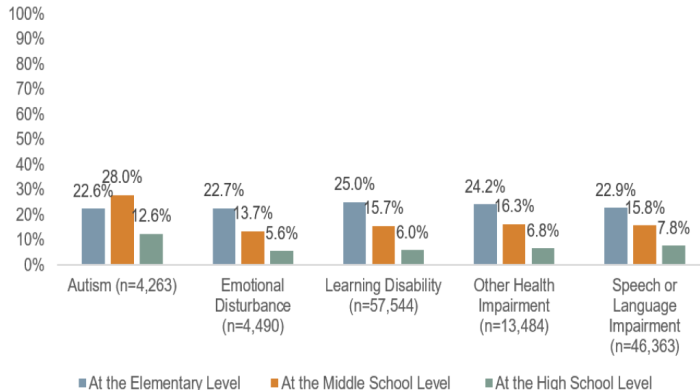2021 At a Glance
During the last year, as schools and communities across the City worked to heal from the disruptions and trauma brought about by COVID-19, the Research Alliance increasingly turned our attention to the long-term recovery and reorientation of the City’s education system. We produced a Blueprint for improving equity in the City’s public schools. We explored links between social-emotional learning and academic outcomes. Members of our team presented on findings from our studies of CTE, Computer Science education, homelessness in elementary schools, and more, in a wide range of settings. Research Alliance findings and experts were featured in various news stories throughout the year, and we were fortunate to have opportunities to engage (remotely) with many different education stakeholders, including students, teachers, parents, CBO staff, and district and initiative leaders.
We hope you enjoy the following recap of our work over the last year, and we encourage you to peruse our website for more Research Alliance content. Find our Year in Review across our social media channels, including our newly launched Instagram account (@theresearchalliance).
Featured Publications
- We released our Blueprint for Advancing Equity in NYC Schools on May 25th with recommendations for how the next mayoral administration can improve equity in the City’s education system. The Blueprint highlighted both areas of improvement and longstanding inequalities, and outlined a framework for 1) measuring educational equity, 2) aligning resources with needs, and 3) using research and innovation to promote more equitable opportunities and outcomes for NYC students. With the help of our partners, we reached thousands of people across our social media platforms and engaged in valuable conversations about the findings and priorities outlined in the Blueprint.
- Even before the Covid-19 crisis and its deep economic effects, over a million New Yorkers were food-insecure. Because many families with children rely on meals provided at school, rates of food insecurity tend to increase sharply during the summer months. Our Summer Meals for NYC Students brief explores how parents in eight high-poverty schools view summer meals programs, including perceived benefits as well as ideas for how these programs might be improved.
- For the last five years, the Research Alliance and the Student Success Network (SSN) have been engaged in a unique research-practice partnership aimed at measuring and supporting New York City students’ social-emotional learning (SEL). Our co-written report with SSN raises some useful questions about how SEL is defined and taught, as well as the overall purpose of schooling (e.g., a narrow focus on academics, vs. a broader vision for developing young adults).
- Our report on the Design2Learn Implementation and Impact Study presents findings about the D2L afterschool program, which aimed at increasing middle school students’ interest, engagement, and achievement in science. The report highlighted a common challenge for afterschool programs during the middle school years: getting students to attend consistently.
Spotlight on Spotlight
Who is Taking Computer Science in New York City Schools?
This Spotlight post uses data from the 2016-2017 through 2018-2019 school years to explore NYC students’ participation in CS across grade bands. We focus here on differences associated with race and ethnicity, gender, and socioeconomic status.
To What Extent Are Students With Disabilities Included in K-12 Computer Science Education?
This Spotlight post uses data on students’ Individualized Education Plans and course enrollment records from the 2018-2019 school year to explore the degree to which students with disabilities are participating in CS.
New Members of Our Team
This year we welcomed four new members to our team.
- Alexandra Adair is a Research Associate at the Research Alliance for New York City Schools. She plays a key role in our study of New York City’s Computer Science for All Initiative.
- Dariana Almeyda-Vega is the Communications Coordinator at the Research Alliance for New York City Schools. She contributes to the execution of the Research Alliance’s communication strategy through the website, social media, and publications.
- Janice Lee is a Technical Research Analyst at the Research Alliance for New York City Schools. She is working on our study of New York City’s Computer Science for All initiative.
- Clare Flack is a Research Associate at the Research Alliance for New York City Schools. Her work at the Research Alliance focuses on our study of career and technical education.
Public Engagement
- Research Alliance Executive Director James Kemple spoke at a meeting of the NYC Racial Justice Commission. Dr. Kemple proposed a framework to help City officials work together with educators, researchers, and community organizations across the City to improve educational equity and particularly to address issues related to systemic and structural racism.
- The Research Alliance co-sponsored a forum on Reimagining the Role of Schools in Society. This free, online event challenged the pre-pandemic status quo and generated ideas about how schools might "build back better" in the areas of mental health, teaching and learning, and racial and social justice.
- Deputy Director Cheri Fancsali moderated a webinar on Engaging Policymakers in Cultivating Interest and Competencies in Computing, hosted by The National Academies of Sciences, Engineering, and Medicine. She also contributed to a related report.
- Members of our team presented at various conferences this year, including AERA, AEFP, SIGSCE, SREE, and NNERPP.
- Research Alliance findings and experts were featured in a variety of news stories throughout the year. We were also pleased to be included on City & State New York’s annual “Education Power 100” list.
- Adriana Villavicencio’s new book, Am I My Brother’s Keeper?, draws on the Research Alliance’s four-year study of the Expanded Success Initiative (ESI) and offers powerful insights into the challenges of implementing large-scale educational change. Dr. Villavicencio also co-authored a new article in the Harvard Educational Review that draws on findings from our study of the Internationals Network for Public Schools.
- Deputy Director Cheri Fancsali, Research Associate Kathryn Hill, and former Research Associate Zitsi Mirakhur are featured in the 50th Volume of Voices in Urban Education (VUE). Their interview with Ron Summers and Christy Crawford, leaders in New York City’s CS4All initiative, examines the close connection between equity and computer science (CS), and Culturally Responsive-Sustaining Education (CR-SE).
On the Horizon
- The Maker Partnership Program (MPP) is a research practice partnership between the Research Alliance for New York City Schools, MakerState, and Schools That Can. MPP developed and tested a new model for building teachers’ capacity to integrate computer science and computational thinking (CS/CT) into regular science instruction using Maker pedagogy. In early 2022, we will release a new report highlighting important lessons from the project.
- The Research Alliance is conducting several related studies of the implementation and impact of New York City’s Career and Technical Education programs. In 2022, we will release new findings about NYC’s CTE-dedicated high schools. This work will leverage the diversity of NYC’s CTE program offerings to explore the conditions under which CTE might be most effective and for whom.
- For decades, federal, state and local accountability systems have focused on educational outcomes like test scores and high school graduation rates, revealing vast disparities between students on the basis of race/ethnicity and socioeconomic status. In 2022, we will be working on a new project that aims to take a systematic account of the disparities in resources and opportunities that might be driving those unequal outcomes.
As 2021 comes to a close, we would like to express our deepest gratitude to our Steering Committee, the partners and funders who make our work possible, and the thousands of educators and students who shared their perspectives with us throughout the year. We welcome your feedback and suggestions for new areas of work. And we wish you and your family a safe, healthy, and happy holiday season.



